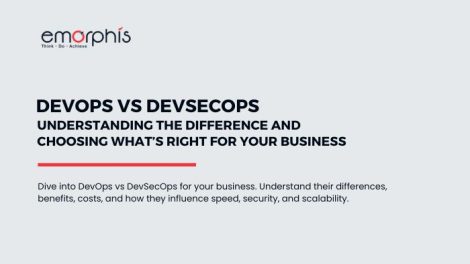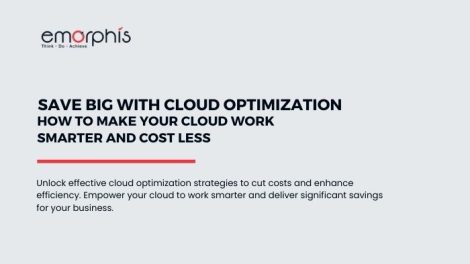When an application fails, no one will hear it from their teams-“the problem is not committed by us but evolved from their side.” What is the end result? The client remains unsatisfied which makes users suffer immensely. And the worst part is that no one tries to find out which team is responsible for such heartbreak. During earlier times, a barrier was always present between developers and operators as they have different goals even if they work to accomplish the same objective. Hence, Let us look at this in detail in DevOps services.
As previously, developers focused on implementing business requirements swiftly to make it a seamlessly working product. On the other hand, operators have the sole responsibility to make the product work in all conditions. If anything goes wrong, everyone is put at risk.
So to end such ongoing conflict, DevOps services come into the picture. DevOps solutions have arrived to mend the relationship between the development and operational teams and unite them to work towards bringing out the final product in the best quality.
The Evolution of DevOps, How It Was Born?
The father of DevOps is no doubt a Belgian called Patrick Debois. He was the first person to coin the term ‘DevOps’. How does the novel idea come into his mind?
Debois had said in an interview that before the birth of DevOps, there was no insight into things other than running apps. As an admin himself, he could not see logins, access the files after failure, and could not do debugging. These issues were the main driving force for Debois to develop a flexible culture that combines development and operational teams to deliver applications without fail.
Now how does the whole procedure get started?
Patrick had quite an interest in IT and in 2007, decided to work on data migration on a large scale. During that time, he found switching back and forth among the development side was creating a lot of frustration for the operational team.
So, he attended a conference held in Toronto in 2008 about ‘Agile Infrastructure’ from a person named Andrew Shafer. Then in 2009, he watched a streaming video about the topic- "10+ Deploys a Day: Dev and Ops Cooperation at Flickr”. Instantly, he got the solution and initially named it as DevSecOps soon shortened to DevOps.
Finally, in 2011, Gartner predicted an upward trajectory of DevOps in upcoming years. It is evident from a forecast that the global DevOps market will see a steep rise from US$ 5.3 billion in 2020 to 20.31 billion in 2028 at an 18.3% growth rate. It shows that in the future, DevOps will dominate the IT world not seen ever before.
What is DevOps & How Does it Work?
DevOps (a portmanteau of two terms, development & operation)is a term that combines multiple tools and applications to deliver services swiftly to surge ahead of traditional software solutions. With DevOps in the background, enterprises are delighted to serve their customers in the best-suited way and also have a far reach to the app market.
Simply explain, DevOps helps the development and operational team to combine their strategy from development to testing and to deployment of the product to offer fruitful results for the customers and business alike.
How DevOps Functions?
Before implementing DevOps, it is essential to know the reason behind the adoption of the newly arrived technology. Don’t just apply for the sake of technology!
What do you need from DevOps? Will it be capable enough to offer you the best quality software apps? Do you want to incorporate to provide faster and cheaper app deliveries to the customers? Or do you want to refurbish your existing IT infrastructure?
So, how DevOps works lies in the hands of enterprises and how they take the journey after getting an answer to the above-given questions.
Therefore, the working of DevOps depends solely on how development and operational teams work in tandem. They don’t become siloed and merge together to form a single team to perform work in the entire application lifecycle from development to testing and deployment and create a product that has multiple functions.
Some DevOps models comprise security and quality assurance teams to work successfully throughout the application lifecycle. Even more, many organizations give more priority to security and form a new technology called DevSecOps.
These teams use automation to work on the development lifecycle. Moreover, they also take the help of tooling and technology stack to operate reliably. Besides, DevOps engineers can use these tools to accomplish their tasks to improve their caliber.
What Problems Does DevOps Solve?
These days, marketing demand is changing with each passage of time. It results in the emergence of challenges that affect the working of the IT environment. However, DevOps works with the cloud in tandem to solve any challenges thrown at them.
A. Time to Market
Software development faces a latency-related issue that causes lots of frustration among team members and users. With DevOps at the helm, all the bottlenecks associated with legacy apps are reduced significantly via automation. Moreover, it also results in a shortening of time for the product to reach the market.
B. Productivity, Productivity & Productivity
With no DevOps, development teams have to wait behind an operational team resulting in the slowing of the entire production procedure. If an enterprise opts for the DevOps philosophy, both the operation and development teams can work together to form smooth integration of automation testing to reduce silos to make it a continuous process and thus boost productivity.
C. App Quality
Traditional methods are too slow which reduces the app quality and makes it redundant in the existing market. Nevertheless, DevOps increases inter-departmental communication to produce higher quality and innovative applications with great speed.
D. Value
No product does magic in the market if it fails to create its own value. But with DevOps, the enterprise can align its business goals with application development to offer real and perceived values to its clients.
DevOps Principles One Must Know
As with any other culture, DevOps also comes with some set of principles. It defines its way of working towards full adoption in the alien environment. Some of the principles are:
Principle 1: Development of Customer-Centric Actions Results in Success
It implies using those products and services that offer maximum satisfaction rates among customers. To show some guts, companies need to be innovative with the inclusion of short feedback cycles.
Principle 2: Create Product Thinking About the End Result
It says that instead of using waterfall and process-oriented models, enterprises need to act like product companies that focus exclusively on delivering services to the actual clients with active engagement of all employees.
Principle 3: Strictly Follow End-To-End Responsibility
This principle makes every team member responsible for the entire life cycle of the product starting from planning to delivering the end-products in the online market securely.
Principle 4: Allow Teams to Function Autonomously
This principle stresses permitting teams to function independently throughout the product life-cycle. It will result in effective personal development and simultaneous growth.
Principle 5: Work towards Continuous Improvement
This principle inspires an enterprise to adapt to changing circumstances by bringing significant improvement in the products and services offered to the client.
Principle 6: Automate Everything in the System
Automation is the one-stop solution for the inclusion of continuous integration and deployment. Besides, it also brings the entire infrastructure code into the cloud for efficient delivery of the product.
Boost Productivity through Powerful DevOps Strategies
DevOps strategy, as defined by Gartner clarifies that it is a customer-driven approach to offer better value for delivering effective app solutions. Gone are the days; when the developer works on a single project writing code for numerous days. It resulted in delaying the deployment of the task among the users.
Why define strategies for DevOps? It is crucial to eradicate communication bottlenecks and stabilize the whole working environment with automation. Now, certain DevOps strategies will surely bring laurels to any reputed DevOps company. Let’s have a look at such robust strategies:
a. Infrastructure-as-a-Code (IaC) for Greater Automation
IaC acts as a blessing in disguise to achieve complete automation in the IT environment. Moreover, it helps in the maintenance of your infrastructure in perfect shape. So, any deviation occurring in a steady state is easily solved by automation via the IaC solution.
b. Continuous Integration (CI)
CI helps in the total amalgamation of the changes done in the building up of the code. With the help of CI, developers can frequently merge the code to save ample time in the development cycle.
c. Continuous Delivery (CD)
The CD helps in the development of high-quality software in a limited time. It also ensures that there is a speedy release of the software with minimum manual intervention. It is a powerful DevOps strategy that enhances the speed and frequency of providing software in the market.
d. Microservice Architecture
It is the latest trend that helps in solving complex applications in the IT environment. Microservices help in communicating with one another which helps in becoming your technology more agnostic.
e. Container Management System
Containerized application is the new strategy that moves the services away from virtualized to container systems. To improvise it, use Kubernetes which helps in managing the containers in the ecosystem and thus enables multi-tenancy on SaaS platforms.
Benefits & Challenges of Taking the DevOps Route
How DevOps Enhance the Morale of Enterprises?
As more businesses are rushing to adopt technology to create a smooth pathway for software development; more emphasis is being given to the performance, quality, and security of the product. So, wider adoption of DevOps brings you immense benefits to boost your business manifold through the following.
Benefits
- Reduce chances of failure of the product: DevOps teams know to deliver the best quality software apps that are relevant in the market and can fit any business, all thanks to the presence of a continuous feedback loop
- Better access to efficiency from the DevOps team: It is clear that DevOps means collective responsibility that results in better productivity and effective engagement with team members
- Products available in the market at a faster pace: Due to the usage of automation tools, it becomes easy to deploy software products in the market quickly
- Offer clear product vision for the team: There is no scattering of the product knowledge as every department is designated with a specific role to bring transparency in the working process and improve decision-making capacity
- Flexibility & Support at the doorstep: The DevOps team develops more scalable applications that are easy to maintain, and it happens due to the adoption of cloud technologies and micro-services
So, these benefits are sure to bring tangible ROI to your system. Even in the longer run, they will help in saving time and enhance your revenue to make your business more competitive.
Challenges That Comes with Implementation of DevOps (& How to Overcome Them)
Despite all the advantages, the implementation of DevOps is not a big task. There are several challenges in DevOps that one must be ready to face with backlash from the users (and there are some tips to overcome them successfully):
1) Traditional Challenges (Organizational & Technical)
Why does it happen? It arises due to the following factors:
- Refurbishing the whole legacy system
- Moving data toward cloud
- Rebuilding team
- Change internal processes (adopting new tools, hiring new members, etc.)
Solution: To checkmate the challenge, prepare the team by offering training so to create a perfect DevOps implementation roadmap.
2) The dilemma in Choosing a Toolset
It becomes difficult for enterprises to choose DevOps tools that will not affect their work after their proper implementation. Another challenge they face is to reduce wastage during the transfer of necessary data to new technology such as the cloud.
Solution: Taking the help of DevOps consulting firms is the best way to move forward to make the correct choice and use the necessary automation tools for their benefit.
3) Lack of Talent
It is difficult to find DevOps experts who have wide experience in this field. Even a leading survey company, Payscale has revealed that filling the position of DevOps engineer is a perplexing task for most employers (including financial aspects).
Solution: Consider DevOps as a service provider and hire a consultant who will guide you in your seamless transition.
DevOps Adoption
DevOps Automation Tools to Watch for Continuous Deployment
Moreover, DevOps is playing a crucial role in offering a seamless environment for automation to build, test, and release projects without further delay. Even DevOps automation services are offering numerous tools that have the caliber to meet every specific DevOps requirement.
Why is there enough noise for implementing automation tools in the DevOps environment? It is because they facilitate ways for some essential aspects that every developer vouches for:
- Sharing & Exchange of Resources
- Acquaintance with the technical know-how of development tasks such as security and operation for generating effective output
Now, how the incorporation of DevOps tools boost your business growth? They are vital in creating new flaws across SDLC and also address some key aspects through:
- Accelerating Product Development
- Improving Operational Efficiency
- Quicker Product Release
- Non-Stop Delivery of the Product
- Adoption of Faster Innovative Rate
- Maintaining Seamless Flow in the Value Chain
Now, DevOps tools come in different variations so grouping them in some categories will be the best option to explain to the viewer easily. Basically, the division of the DevOps tool is done in two sections:
a. DevOps Tools by Functionality
If one thinks that manual operations are still part of an organization’s functioning, they are utterly wrong. Now, automation rules the root of the world! In the given case, DevOps automation tools offer help to make software procedures a smooth one. Here are a few tools:
- Puppet- Automate & Simplifies critical manual tasks
- Jenkins-Enable CI/CD for integrating the entire DevOps chain
- Terraform- Facilitate the provision of private & public cloud infrastructure
- Ansible- A configuration module that supports cloud provisioning
- Docker- Creates isolated settings for container apps
- Vault- Open source tool to store confidential data through encryption
b. DevOps Tools by Requirement
Again, it is categorized in three parts as per the arising of the specific requirements and includes:
i. DevOps Tools for Measurement
For any IT organization, the key to achieving success is by opting for those DevOps tools that help in successfully analyzing, conducting, and measuring an auditing process. Some of the tools are:
- Splunk- Monitor & explore machine-generated data
- Graphite- Convert machine-generated data into an on-demand graph
ii. DevOps Tools for Continuous Testing
Continuous Testing or CT involves automating testing of the software at each procedure of SDLC. Its objective is to assess software quality at every stage of the continuous delivery to flush out any flaws. Some of the testing tools are:
- Selenium- An automated testing tool that supports multiple OS & browsers
- Watir- An automation tool based on Ruby
iii. DevOps Tools for Continuous Delivery
IT farms are fast-forwarding their track in implementing DevOps servicesdue to two crucial aspects namely; continuous delivery and integration. Some tools or continuous delivery are:
- Jenkins- Offer hundreds of plugs for building, deploying, and automating projects
- GitHub- Makes information exchange efficient and easier
- Kubernetes- Offer solutions for server management
Skills That Must be Part of DevOps Programmers
What is the utmost priority of DevOps developers? It is the delivery of high-value products in a short time frame. To make it possible, some kind of skills concerning interpersonal and technical aspects are required to become successful. In other words, what a DevOps services engineer needs is a combination of both soft and hard skills.
If you have experts in your kitty, it is well and good. If not, one can check those skills to improve and refine for their overall career development.
a. Communication & Collaboration Skill
To succeed in DevOps rivalry, one must possess very good collaboration and communication skills. It helps in breaking silos between teams and implements DevOps culture with great efficacy.
b. Security Skills
Without a secure environment, development and operational teams can't keep data safe. So, DevOps engineers must integrate security with SDLC to make the whole procedure safe and effective.
c. Automation Skills
A DevOps engineer must have a good command over automation as manual working has taken the back seat. It is a skill that must be a part of the DevOps developer to automate the entire pipeline successfully.
d. Soft Skills
What do DevOps services emphasize? It stresses culture and people. So, people must have soft skills like listening, assertiveness, a positive attitude, and many others to deliver the work on time.
e. Coding & Scripting Skill
These are two crucial mindsets that DevOps services engineers must have with them. So knowledge of programming/scripting languages such as Python, Java, PHP, and node.JS will help accomplish goals efficiently.
f. Cloud Skills
Cloud and DevOps are inseparable in present times. While DevOps drives the process, the cloud provides a suitable platform to perform vital functions of code (test, deploy, and release).
g. Testing Skills
It is a vital skill as it will avoid failure in the DevOps automation pipeline. Learning testing skills will help developers to speed up the process and deliver quality apps to the end-users.
Last Thought
Thus, DevOps services are the current topic that is creating a buzz in the business circle. Individuals have the wrong interpretation: Is DevOps simply software? Or is it merely an app? Contrary, DevOps services is a concept that is a combination of Dev and Ops teams that invest their whole energy to achieve a common goal.
Find the Cloud portfolio or check our Cloud Computing Services
DevOps services do a wonderful thing: They bring processes and tools for people where they work together to create a united front for the benefit of the environment. Moving to DevOps is a journey! Based on DevOps services philosophy, you can utilize its process, practices, workflow, and frameworks to create a secure network with high speed and minimum risks.
Find details of DevOps - Benefits for Business to Excel







